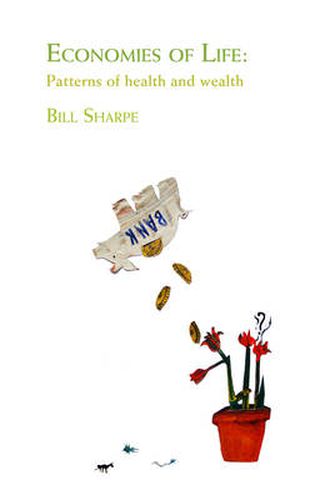Readings Newsletter
Become a Readings Member to make your shopping experience even easier.
Sign in or sign up for free!
You’re not far away from qualifying for FREE standard shipping within Australia
You’ve qualified for FREE standard shipping within Australia
The cart is loading…






This title is printed to order. This book may have been self-published. If so, we cannot guarantee the quality of the content. In the main most books will have gone through the editing process however some may not. We therefore suggest that you be aware of this before ordering this book. If in doubt check either the author or publisher’s details as we are unable to accept any returns unless they are faulty. Please contact us if you have any questions.
Economies of Life argues cogently that there is a ‘default assumption that there is only one economy in our lives - the economy which is the one based on money. Our position is that there are many economies, of which the one based on money is just one, and that they all contribute to the health and sustainability of our shared lives’. To extend this thinking, money is the currency of trade, and art is the currency of experience. In his collection of five essays, Bill Sharpe uses the principles of ecological thinking to redefine our hitherto narrow understanding of terms like economy and value. The essays consider - with poetic sensitivity and intellectual clarity - what keeps each economy healthy, what sort of wealth each one accumulates and what sort of policies are most supportive of innovation and sustainability in a changing world. Bill Sharpe and a small group of other IFF* members, working with the Watershed Media Centre in Bristol, took as the starting point for their inquiry the question ‘Can we help people who fund the arts develop better policies if we use ecological thinking to understand how the arts work in society and in the economy?’ The resulting parallel publication from the Watershed - Producing the Future: Understanding Watershed’s role in Ecosystems of Cultural Innovation - catalogues the thinking undertaken by the IFF and the Watershed in order to understand what makes for a healthy, creative, innovative ecosystem. It offers as a case study the experience of putting these emerging ideas into practice at the Watershed. The insights resulting from both Economies of Life and Producing the Future offer an ecologically informed and dynamic framework for understanding creativity, the arts and how the arts should be funded into the future.
$9.00 standard shipping within Australia
FREE standard shipping within Australia for orders over $100.00
Express & International shipping calculated at checkout
This title is printed to order. This book may have been self-published. If so, we cannot guarantee the quality of the content. In the main most books will have gone through the editing process however some may not. We therefore suggest that you be aware of this before ordering this book. If in doubt check either the author or publisher’s details as we are unable to accept any returns unless they are faulty. Please contact us if you have any questions.
Economies of Life argues cogently that there is a ‘default assumption that there is only one economy in our lives - the economy which is the one based on money. Our position is that there are many economies, of which the one based on money is just one, and that they all contribute to the health and sustainability of our shared lives’. To extend this thinking, money is the currency of trade, and art is the currency of experience. In his collection of five essays, Bill Sharpe uses the principles of ecological thinking to redefine our hitherto narrow understanding of terms like economy and value. The essays consider - with poetic sensitivity and intellectual clarity - what keeps each economy healthy, what sort of wealth each one accumulates and what sort of policies are most supportive of innovation and sustainability in a changing world. Bill Sharpe and a small group of other IFF* members, working with the Watershed Media Centre in Bristol, took as the starting point for their inquiry the question ‘Can we help people who fund the arts develop better policies if we use ecological thinking to understand how the arts work in society and in the economy?’ The resulting parallel publication from the Watershed - Producing the Future: Understanding Watershed’s role in Ecosystems of Cultural Innovation - catalogues the thinking undertaken by the IFF and the Watershed in order to understand what makes for a healthy, creative, innovative ecosystem. It offers as a case study the experience of putting these emerging ideas into practice at the Watershed. The insights resulting from both Economies of Life and Producing the Future offer an ecologically informed and dynamic framework for understanding creativity, the arts and how the arts should be funded into the future.